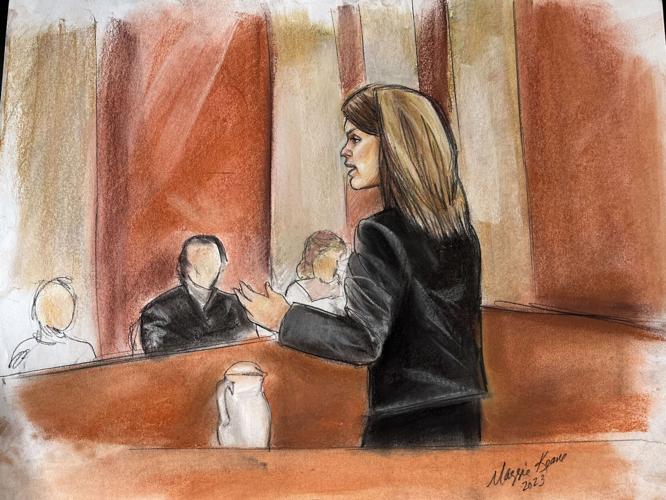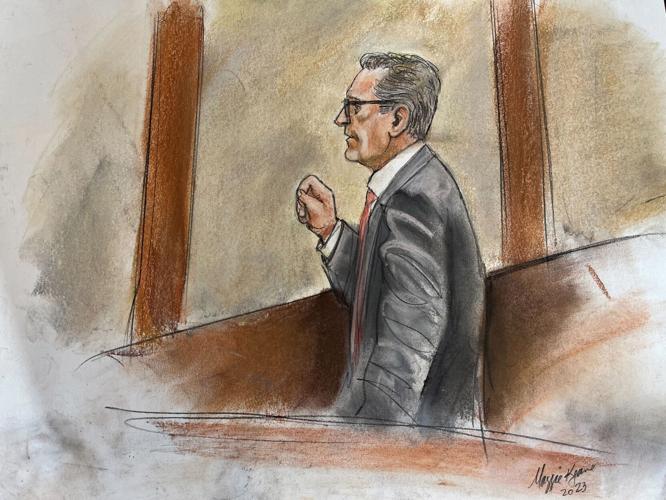After 10 days of testimony from 30 witnesses, a jury is now deliberating whether Christopher Clements is guilty of kidnapping and first-degree murder in the 2012 death of Isabel Celis.
Trial for Clements, who is accused of breaking into the Celis home and abducting Isabel, age 6, began Feb. 14 in Pima County Superior Court. Prosecutors say he became a suspect when he led investigators to the location of her remains in 2017, in return for authorities dropping unrelated charges against him.
The courtroom gallery was full Wednesday afternoon for closing arguments, with dozens of law enforcement officers, attorneys, courthouse employees and members of the public crowding onto the wooden benches.
“When the Celis family went to bed on the night of April 20, 2012, they had no way of knowing the unbelievable nightmare they would wake up to the next morning,” Deputy Pima County Attorney Tracy Miller told the jury. “How on earth does someone take a 6-year-old child out of their bedroom window in the middle of the night?”
“Who could do such a thing?” she asked loudly. Then, reminding them of testimony about Clements’ behavior, she added: “How about someone who plants a note in their front yard with the name Isabel Celis hidden under a rock? How about someone who takes surreptitious photos of little girls in the Tucson area?”
Miller projected a photo of a young Hispanic girl onto a wall-sized television screen. A detective previously identified the photo, along with several others found on Clements’ devices, as being taken in Tucson.
“How about someone who has folders and folders of little girls scantily clad? How about someone who for this time period in between Isabel’s abduction and when she’s found does searches (of her name) on his devices?” Miller asked. “Who does that? The person who abducted and murdered Isabel Celis.”
Miller talked about the cell phone evidence that Clements’ phone, in the early morning hours of Isabel’s disappearance, was near her home and in the remote desert area where her remains were later found.
She also noted Isabel’s open bedroom window and the screen that was bent and propped up against the house. Police pulled prints from the outside, but they lacked ridge detail and were indistinguishable.
Miller reminded the jury that she’d told them there would be no eyewitnesses, fingerprints or DNA, but said the state presented an overwhelming amount of circumstantial evidence showing that only Clements could be responsible for Isabel’s disappearance and death.
“This was something that was planned very carefully to avoid any detection,” Miller said, reminding the jury of several calls from Clements’ cell phones to the Celis landline six months before Isabel disappeared, as well as on an afternoon a week before, when Isabel’s father, Sergio Celis, came home to find his dogs had been let out of the yard.
Miller told the jury things that seemed like coincidence were circumstantial evidence of Clements’ guilt. She talked about the $110 carwash he got the day after Isabel was reported missing, and about his phone’s movements, which were not consistent with the story he told police about where he was.
She said Clements’ waited patiently for years until his knowledge of the crime was something he believed he could benefit from, then finally decided to tell police the location of the remains.
“In this courtroom, that part of the nightmare for the Celis family — ‘who did this?’ — ends,” Miller said. “We may not know exactly how he got Isabel Celis out of her window that morning, but what we do know over the last two-and-a-half weeks is that the person responsible is Christopher Clements.”
‘Is there some other way ...?’
Defense attorney Eric Kessler told the jury this is one of the worst cases he’s ever tried, calling it “tragic” and “horrible.”
“One thing that could make it worse, though, is to compound this tragedy by wrongfully convicting the wrong person,” he said.
Kessler told the jurors about the burden of proof the state has to prove Clements’ guilt, asking them if there was some other way the death could have happened.
“I urge each of you to challenge at least one other juror to find one piece of evidence that makes it possible for someone other than Chris Clements to have done this,” Kessler said, adding that if they are unable to do so, that means there’s a “real possibility” Clements is innocent.
Kessler called the state’s use of the photos found on Clements’ devices “character assassination,” saying prosecutors were simply trying to paint him as a creep.
He explained to the jury that he doesn’t have to prove Sergio Celis’ guilt to make him a viable suspect, but that he just needed to present evidence that the victim’s father might have had something to do with it.
Kessler pointed out that Isabel’s favorite clothes were missing from her room when she went missing, and that Sergio Celis claimed to be sleeping on the couch in the living room near Isabel’s bedroom.
He told the jury there was no evidence presented to show that Sergio Celis didn’t go into his daughter’s room, pack up her things as if she were going on a trip, and walk her out the front door “to somebody else,” returning later to lock the door from the inside and report his daughter missing.
He also noted that the cell tower near Isabel's house that Clements' phone pinged off of in the early hours of the morning she disappeared has a coverage area of about 150 square miles, which included his own home.
Kessler referred to testimony by the cell phone tracking expert, which showed Clements’ phone in the area of the desert recovery site at around 10 a.m. the morning of Isabel’s disappearance.
“It’s an interesting theory that someone who would meticulously plan the abduction of Isa, so successfully avoid waking up any of the dogs, waking up any of the people, not being caught on any surveillance videos and not being seen by neighbors, would pick the middle of the day to deposit that body,” he said. “It doesn’t make sense.”
Kessler said having knowledge of a crime isn’t illegal and that there are “any number of ways he could have known,” saying it was up to the state to prove how Clements knew, but they failed to do that.
“They just thought, ‘he knew where the remains were, the jury will find him guilty,’ “ Kessler said. “But that’s not what the jury instructions (from the judge) tell you to do.”
During her rebuttal, Miller told the jurors that Kessler was inviting them to do what police did in 2012 and look at the family. Police never charged any family member with being involved.
“This has been enough of a nightmare for this family and to suggest that they had anything to do with Isabel disappearing is offensive,” Miller said, voice raised. “Especially at this point, especially given everything we know about Christopher Clements and this case.”
Defense presents its case
Before closing arguments, the defense called witnesses Tuesday and Wednesday, including a former Tucson police detective. She allegedly expressed previous doubts Clements was guilty, but the jury did not hear about that.
The prosecution filed a motion last week seeking to prevent the former detective from testifying about those doubts.
Superior Court Judge James Marner ruled Monday that the former detective would not be allowed to testify about her doubts, saying he found the information to be immaterial and irrelevant.
The former detective, Bryn Fox, instead testified for the defense about her involvement in the investigation into Isabel’s disappearance, saying she was one of the first detectives assigned to the case. She described an attempted recreation of entering and exiting the house through Isabel’s bedroom window, saying a fellow officer struggled to enter the window without resting his hands on furniture inside the bedroom.
When Kessler asked her if they considered the front door to the home a potential point of entry, she said Tucson police had “considered every access point into and out of that home.”
Kessler asked Fox what evidence of an intruder they found during the initial investigation, as he cited the lack of fingerprints and physical evidence tying anyone to Isabel’s abduction. Fox said the lack of an “answer to how entrance and exit had been made to the house” was evidence enough, although not blatant.
During the initial investigation, Tucson police asked Isabel’s mother, Becky Celis, to participate in a monitored phone call with her husband Sergio to try to uncover new details. Fox agreed with Kessler that it was “fair to say that when police are contemplating doing (such) a confrontation call,” their suspicion of the subject “has been elevated.”
Clements’ defense team also called another police detective involved in the initial investigation.
Detective Dan Berry testified he examined copies of Sergio and Becky Celis’ phones, finding no text messages prior to April 20, 2012 on either. He said that while he couldn’t remember the specific model of phone Sergio Celis had been using, his report indicated it was “capable of holding large amounts of data.”
Sergio and Becky Celis previously testified they frequently deleted text messages to preserve data.
Jury instructions
To secure a conviction of first-degree murder, the state must prove the crime was either premeditated or considered “felony murder.”
Marner explained to the jury in his final instructions before they began deliberating late Wednesday that premeditation requires a decision to kill, reflection on that decision, and acting on the decision. “Felony murder” in this case would be a murder committed in the course of a kidnapping, which Arizona law defines as restraining someone with the intent to do physical harm or to aid in the commission of a felony.
The jury does not have to unanimously degree on whether the crime was premeditated or felony, they just have to agree that it was one or the other.
Clements, a convicted sex offender, has already been sentenced to natural life in prison in connection with 13-year-old Maribel Gonzalez’s 2014 murder, and another 17 years for her kidnapping, which will be served consecutively. That information was not given to jurors in the Celis case.
The jury of eight men and four women began deliberating Thursday morning in Superior Court.
Christopher Clements is accused of kidnapping and killing 6-year-old Isabel Celis in 2012. His month-long trial started on February 14. Catch up here on what's happened so far.
Video by Caitlin Schmidt / Arizona Daily Star.







